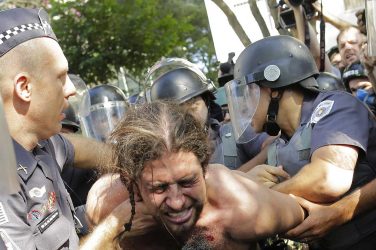Thirteen police officers have been detained for allegedly participating in a recent massacre that killed ten campesinos in the state of Pará, north of Brazil, the most deaths in a land conflict since 1996.
The police agents have been handed over to the federal police in the cities of Redenção and Belém, in Pará state, and will be detained for at least 30 days until their trial.
“As they are military and civilian police … they must be kept in places suitable to their conditions, in this case in the Military Police headquarters,” Judge Haroldo Silva da Fonseca said of the ruling.
Ten rural workers, nine men and one woman, on the Santa Lúcia farm in the town of Pau D’Arco were killed by Brazil’s military and civilian police as part of an eviction order led by state forces on May 24.
Security officials alleged that the police were fired upon as soon as they arrived at the farm to carry out 14 arrest warrants against people accused of the killing of a security guard employed by the ranch owner a month before. No officers had any injuries after the conflict.
Survivors, witnesses, and victims’ family members contradict these claims, saying that police arrived on the scene shooting and made no attempt to inform anybody of a legal order.
The victims were members of the League of Poor Campesinos, a group of landless activists and 150 families seeking an agrarian reform in the area.
The United Nations and the Interamerican Court of Human Rights have already condemned the killing and the excessive use of force by the police, demanding answers from the government of Brazilian president Michel Temer.
In 1996, Pará state police shot and killed 19 land activists who had blocked a highway to protest their right to remain on a ranch that 3,000 families had occupied.
Pará is the same state where Dorothy Stang, a U.S. born, Brazilian-naturalized nun was murdered by armed gunmen who were contracted by ranchers. For decades, Stang worked alongside and as an advocate for peasant farmers.
The Catholic Church’s Pastoral Land Commission said in a statement that 61 people have been killed in rural conflicts in 2016, with 26 killed this year.
teleSUR














